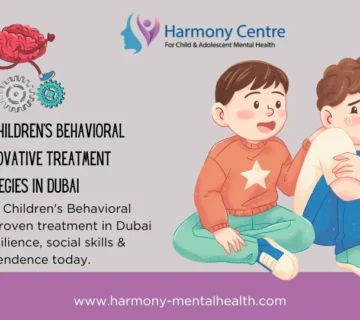Sensory Therapy Autism Dubai: Enhancing Sensory Integration for Children at Harmony Centre
Discover sensory therapy for autism in Dubai at Harmony Centre. Our evidence‑based, multidisciplinary approach helps children manage sensory sensitivities and improve focus.
Contact Information
| Contact Method | Details |
|---|---|
| Phone | +971 (52) 8773268 / 04 558 2015 |
| Click Here | |
| info@harmony-mentalhealth.com | |
| Address | Office 409, Building Alrazi-64C, 26th St, Healthcare City, Dubai |
Introduction
In Dubai’s vibrant and fast‑paced environment, children with autism often face unique challenges related to sensory processing. These challenges may manifest as either hypersensitivity or hyposensitivity to stimuli, which can impact a child’s ability to learn, socialize, and perform daily activities. At Harmony Centre Mental Health Dubai, we provide specialized sensory therapy for children with autism designed to enhance sensory integration. Our evidence‑based, multidisciplinary approach combines clinical expertise with creative, child‑friendly interventions, empowering children to manage sensory sensitivities and improve their overall functioning.
Learn More About Harmony Centre • Contact Us
Understanding Sensory Therapy
What Is Sensory Therapy?
Sensory therapy is a specialized therapeutic intervention aimed at helping individuals with sensory processing difficulties. For children with autism, this therapy focuses on improving the way their brains interpret and respond to sensory information. Rather than simply trying to eliminate sensory issues, sensory therapy seeks to create a balanced sensory environment that enhances learning and everyday functioning.
Core Components of Sensory Therapy
- Sensory Integration Techniques:
These techniques help children process sensory inputs (touch, sound, sight, smell, and taste) more effectively. - Therapeutic Play:
Engaging activities that incorporate sensory-rich materials and experiences to stimulate development. - Adaptive Strategies:
Methods that teach children how to cope with overwhelming sensory stimuli, thereby reducing anxiety and behavioral challenges. - Environmental Modifications:
Adjustments to the home, classroom, or therapy setting to create a supportive sensory environment.
How Sensory Therapy Works for Autism
Sensory therapy employs a variety of strategies to help children with autism achieve a more balanced sensory experience. Through structured activities and individualized interventions, therapists aim to:
- Modulate Sensory Responses:
Helping children learn to regulate their reactions to sensory stimuli. - Enhance Focus and Attention:
By reducing sensory overload, children can improve their concentration during academic tasks and social interactions. - Improve Motor Skills:
Many sensory activities also support the development of fine and gross motor skills. - Reduce Anxiety:
A balanced sensory system helps decrease anxiety levels and improves overall emotional regulation.
The Importance of Sensory Therapy for Children with Autism
Challenges Faced by Children with Autism
Children with autism frequently experience sensory processing issues that can hinder their daily functioning. Common challenges include:
Hypersensitivity
- Overwhelming Stimuli:
Bright lights, loud noises, or certain textures may cause discomfort or distress. - Avoidance Behaviors:
In response, children might avoid activities or environments that trigger sensory overload.
Hyposensitivity
- Under-Responsiveness:
Some children may have a reduced response to sensory input, leading to challenges with balance, coordination, or recognizing danger. - Increased Seeking Behavior:
These children might engage in excessive movement or repetitive behaviors to stimulate their senses.
Benefits of Sensory Therapy
Early and targeted sensory therapy can yield transformative benefits for children with autism:
- Enhanced Sensory Processing:
Improved ability to filter and respond appropriately to sensory stimuli. - Better Focus and Learning:
A balanced sensory system supports improved concentration and academic performance. - Reduced Behavioral Outbursts:
By mitigating sensory overload, children experience fewer meltdowns and anxiety episodes. - Improved Social Engagement:
As sensory challenges diminish, children can participate more fully in social interactions and build meaningful relationships. - Increased Independence:
Better sensory integration enables children to perform daily tasks more effectively, boosting confidence and self‑reliance.
Our Approach at Harmony Centre
Comprehensive Assessments for Sensory Processing
At Harmony Centre, our journey begins with a thorough assessment to understand each child’s unique sensory profile. Our comprehensive evaluations include:
Initial Consultation
- Family and Medical History:
We gather detailed background information regarding your child’s developmental milestones, previous interventions, and any noted sensory challenges. - Parental Observations:
Parents share insights about behaviors at home—such as reactions to certain textures, sounds, or lighting—which are critical to the assessment. - Preliminary Screening:
A brief evaluation identifies the main areas of sensory difficulty and informs the need for further assessments.
Standardized Testing and Direct Observations
- Validated Instruments:
Our clinicians use scientifically‑validated tools to measure sensory processing, motor skills, and cognitive functioning. - Behavioral Observations:
We observe your child during both structured therapy sessions and natural play to capture authentic sensory responses. - Collaborative Feedback:
Input from parents, educators, and caregivers is collected through questionnaires and interviews, ensuring a holistic view of your child’s sensory profile.
Learn More About Our Assessment Process
Multidisciplinary Team Collaboration
Our multidisciplinary team at Harmony Centre includes occupational therapists, speech therapists, psychologists, and child psychiatrists. This team collaborates closely to develop a comprehensive diagnostic profile and an individualized intervention plan.
Integrated Team Review
- Interdisciplinary Meetings:
Regular team meetings ensure that every specialist’s insights are considered, leading to a cohesive treatment strategy. - Diagnostic Profile:
We create a detailed profile that outlines your child’s strengths, challenges, and specific sensory sensitivities. - Goal Setting:
Clear, measurable goals are established to guide the therapy process, ensuring continuous progress.
Culturally Sensitive Considerations
- Tailored to Dubai’s Diversity:
Our assessments and interventions are adapted to respect the cultural and linguistic diversity of Dubai’s population. - Multilingual Support:
Services are offered in multiple languages, ensuring clear communication and effective care.
Personalized Sensory Therapy Intervention Plans
Based on the comprehensive assessments, we design a personalized sensory therapy plan that addresses your child’s unique needs.
Individualized Therapy Sessions
- Targeted Sensory Integration Techniques:
Therapists use activities like swinging, weighted blankets, and tactile play to help your child regulate sensory input. - Adaptive Strategies:
Structured exercises teach your child how to cope with overwhelming stimuli and enhance their tolerance levels. - Motor Skills Development:
Activities to improve fine and gross motor skills, such as hand-eye coordination drills, support both sensory processing and daily functioning. - Repetitive Practice and Reinforcement:
Consistent, guided practice helps to establish new neural pathways, improving overall sensory processing over time.
Group Therapy and Peer Interaction
- Collaborative Play:
Group sessions allow children to engage in sensory-rich activities with peers, fostering social skills and mutual support. - Structured Group Activities:
Interactive games and role‑playing exercises promote social engagement and help children learn to navigate sensory challenges in a communal setting. - Motivational Feedback:
Positive reinforcement from therapists and peers builds confidence and encourages active participation.
Family-Centered Support
- Parental Workshops:
We offer workshops that provide parents with practical strategies to support sensory integration at home. - Home Practice Programs:
Tailored exercises and activities for the family ensure that therapy techniques are reinforced outside of sessions. - Ongoing Follow‑Up:
Regular follow‑up sessions monitor progress and allow for adjustments to ensure that the intervention remains effective.
Evidence-Based Outcomes and Success Stories
Quantitative Improvements
Our evidence‑based sensory therapy interventions have demonstrated significant improvements in children with autism:
- Improved Sensory Processing:
Many children show a marked reduction in over- or under-responsiveness to sensory stimuli. - Enhanced Focus and Concentration:
As sensory regulation improves, children experience better concentration in academic and social settings. - Reduced Behavioral Outbursts:
Consistent sensory therapy leads to fewer meltdowns and a calmer demeanor during daily activities.
Qualitative Success
Real-life success stories highlight the transformative impact of our sensory therapy programs:
“Since starting sensory therapy at Harmony Centre, my son has become much more comfortable in noisy environments. His ability to focus during school has improved dramatically.”
– Parent Testimonial
“The individualized sensory therapy sessions have been life‑changing for my daughter. She is less overwhelmed by textures and sounds, and her confidence has grown significantly.”
– Parent Testimonial
For more insights into sensory integration therapy, visit the American Occupational Therapy Association (external link).
Practical Strategies for Families, Educators, and the Community
For Families
Create a Sensory-Friendly Home Environment
- Designate a Quiet Space:
Set up an area free of sensory overload where your child can relax and practice sensory exercises. - Use Consistent Routines:
Maintain a daily schedule that includes regular sensory activities and breaks to manage overstimulation. - Incorporate Sensory Play:
Engage in activities like playdough, water play, or textured puzzles that are both fun and therapeutic.
Reinforce Therapy at Home
- Practice Daily Exercises:
Implement simple sensory integration activities, such as deep pressure massages or weighted vest use, as recommended by your therapist. - Monitor and Record Progress:
Keep a journal of your child’s responses to different sensory stimuli to share with your therapist. - Celebrate Achievements:
Acknowledge and celebrate small improvements to build your child’s confidence.
For Educators
Adapt the Classroom Environment
- Sensory Breaks:
Integrate short breaks during lessons where children can engage in calming sensory activities. - Quiet Zones:
Create designated areas in the classroom where students can retreat if they feel overwhelmed. - Interactive Learning:
Use hands‑on, sensory-rich activities to help children stay engaged and focused.
Collaborate with Therapists
- Regular Updates:
Maintain communication with occupational therapists to align classroom strategies with your child’s therapy goals. - Incorporate Feedback:
Use insights from therapy sessions to adjust teaching methods and support individual sensory needs. - Peer Interaction:
Encourage group activities that promote social skills and provide a structured, supportive learning environment.
For the Community
Engage in Local Workshops and Support Groups
- Community Seminars:
Attend events focused on sensory integration therapy and effective strategies for managing sensory sensitivities. - Support Networks:
Join parent and educator groups to exchange ideas, experiences, and resources. - Advocate for Inclusive Environments:
Support initiatives that promote sensory-friendly public spaces in schools, community centers, and recreational facilities.
Utilize Digital Resources
- Telehealth Consultations:
Use online platforms to access expert advice on sensory therapy and maintain continuous support. - Educational Apps:
Leverage digital tools that offer interactive sensory exercises and mood tracking to reinforce therapy between sessions.
Explore Our Community Initiatives
Contact Harmony Centre
Frequently Asked Questions about Sensory Therapy Autism Dubai
Book a Consultation Now
Contact Information
Office Address:
Office 409, Building Alrazi-64C, 26th St, Umm Hurair 2, Dubai Healthcare City, Dubai
Phone:
+971 4 558 2015
+971 5 287 73268
Email:
info@harmony-mentalhealth.com
Final Thoughts about Sensory Therapy Autism Dubai
Sensory therapy is a powerful tool in enhancing the quality of life for children with autism. At Harmony Centre Mental Health Dubai, our comprehensive, evidence‑based approach to sensory integration helps children manage sensory challenges and improve their focus, social skills, and overall well‑being. By tailoring interventions to each child’s unique needs and continuously supporting families and educators, we empower young minds to thrive in every aspect of life.
Invest in your child’s future with expert sensory therapy at Harmony Centre—a trusted partner in creating a supportive, inclusive environment where every child can reach their full potential.
Learn More About Harmony Centre
Get in Touch
👉 Book a Consultation Now: Call +971 4 558 2015 or visit www.harmony-mentalhealth.com.
Join our online community and stay updated with our latest events, articles about Sensory Therapy Autism Dubai



